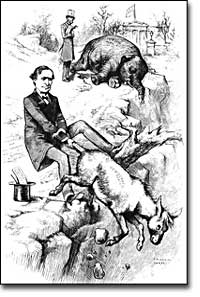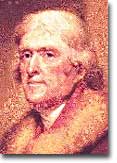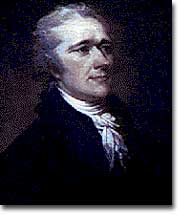5a. Political Parties

During the 1860s, Thomas Nast — a cartoonist for the magazine Harper's Weekly — developed the idea of using the donkey and the elephant to represent the Democrats and Republicans, respectively. The above cartoon — titled "Stranger Things Have Happened" — dates from 1879.
From the beginning, American political parties have had a tarnished reputation. In his 1796 Farewell Address to the nation, George Washington warned against "the baneful effects of the spirit of party" as inciting American citizens "with ill-founded jealousies."
Today many Americans take pride in their status as "independent voters," partly because they see parties as lacking vision for the country. Since many Americans have become disenchanted by partisan politics, they avoid identification as a "loyal Democrat" or a "staunch Republican." These negative attitudes toward parties are rooted in the roles that they play in American politics.
Roles of Political Parties
- Running candidates for political office. Parties select candidates for many elected positions in American politics. With so many officials to choose, most voters would be overwhelmed by the decisions they would have to make if candidates did not wear party "labels." Parties present policy alternatives for voters. Some voters even choose a straight ticket, or candidates from the same party for all positions in that election.

Thomas Jefferson opposed the views of Alexander Hamilton and John Adams regarding centralized government and states' rights; and in doing so helped to build the foundation of the modern Democratic Party. - Checking the other party. A party that does not hold the majority in Congress often keeps the party in power from taking complete control. Party leaders can publicly criticize actions of a President who was elected by the opposite party. The criticism of "partisanship" comes from this party role because many Americans think that the "checking" becomes petty and self-serving.
- Informing the public.Parties take stands on issues and criticize the points of view of the other parties. Their well-publicized discussions help to inform citizens about important issues and present alternative ways of solving societal problems.
- Organizing the government.Congress and the state legislatures are organized according to party affiliations. Legislative representatives usually support their party's position when considering potential laws and policies, and most votes fall roughly along party lines. Virtually all candidates run for public office with party labels that define their behavior after they win.
Why a Two-Party System?

The Green Party encourages its members to work in grassroots efforts on issues of ecology and social equality. In both 1996 and 2000, consumer advocate Ralph Nader was the Green Party nominee for President.
Most other democratic nations have multi-party systems. Even though third parties have popped up regularly throughout American history, they have either died, or their ideas have been absorbed by a major party. Three good reasons for the American two-party system include the following:
- Consensus of Values.It is easy to complain about petty bickering between Democrats and Republicans. What we sometimes forget is that Americans share a broad consensus, or agreement, of many basic political values. Both parties believe in liberty, equality, and individualism. Neither advocates that the Constitution be discarded. Both parties accept the election process and concede defeat to the winners. In many countries with multi-party systems, the range of beliefs is greater, and disagreements run deeper. For example, in modern day Russia, one party advocates a return to communism, some offer modified socialism and/or capitalism, and one promotes ultra-nationalism.
- Historical Influence.The nation began with two political parties — the Federalists and the Democratic-Republicans. During early American history politicians tended to take sides, starting with the debate over the Constitution, and continuing with the disagreements between two of George Washington's cabinet members — Alexander Hamilton and Thomas Jefferson. The tendency has persisted throughout American history.
- The Winner-Take-All System.The single most important reason for a two-party system is the winner-take-all electoral system. In contrast to systems with proportional representation, the winner in American elections is the one who receives the largest number of votes. The winner does not need to have more than 50 percent, but only one vote more than his or her opponents. If a third party receives 15% of the vote for every contested Senate seat, that party wins zero seats in the United States Senate. Consequently, one of the two major parties almost always wins a plurality, and third parties are completely shut out of national offices.

Alexander Hamilton contributed to laying the framework of the modern Republican Party. His support for the ratification of the U.S. Constitution led to the formation of the Federalist Party, which fizzled out by 1824.
Even though political parties are often regarded as "necessary evils," they still play an important role in American government and politics today. The two broad-based major political parties offer alternatives to voters and help connect citizens to their government.







